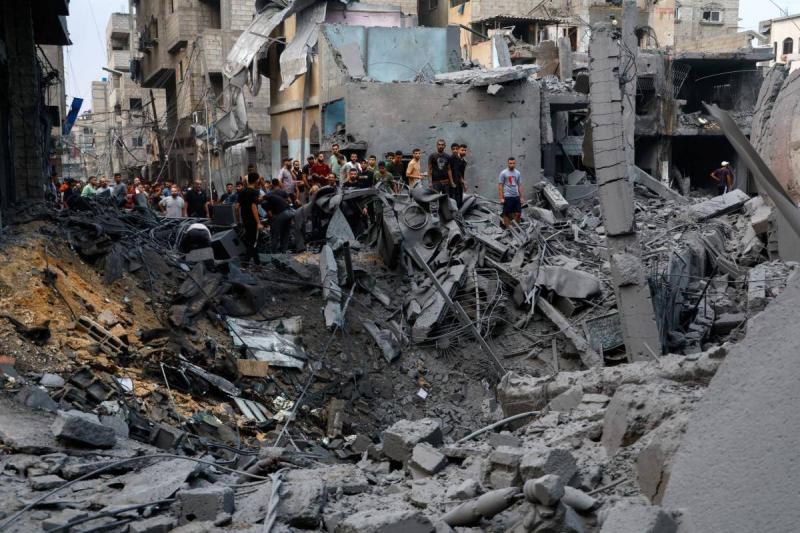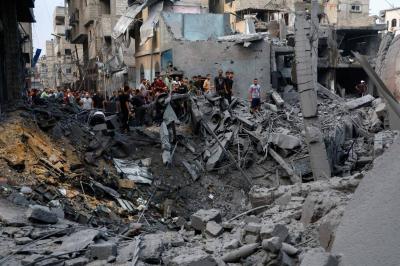A Western official, a Palestinian source, and two Egyptian sources have announced that Israel is seeking to make amendments to a plan aimed at reaching a ceasefire in Gaza and securing the release of prisoners held by the Palestinian Islamic resistance movement (Hamas), complicating efforts to reach an agreement that would end the nine-month-long fighting that has devastated the region.
The four sources indicated that Israel claims that a screening must be conducted for Palestinian displaced persons when they return to northern Gaza as the ceasefire begins, retracting a prior agreement that allowed civilians who fled south to return to their homes freely. The Western official noted that Israeli negotiators "want a screening mechanism for civilian residents returning to northern Gaza, as they fear these residents may support Hamas fighters who are still holed up there."
The Palestinian source and the two Egyptian sources pointed out that Hamas has rejected the new Israeli demand. The Egyptian sources also noted another point of contention regarding Israel's demand to maintain control over the Gaza border with Egypt, a request that Cairo rejects as going beyond any framework for a final agreement acceptable to the parties.
The office of Israeli Prime Minister Benjamin Netanyahu and both the White House and the Egyptian Foreign Ministry did not immediately respond to requests for comment on Israel's demands. Prominent Hamas leader Sami Abu Zuhri stated: "Netanyahu is still maneuvering, and there is no change in his position," without directly addressing Israel's demands.
The report of new points of contention comes as U.S. President Joe Biden, during talks in Washington with Netanyahu on Thursday, called for a final agreement to achieve a ceasefire. White House National Security Council spokesperson John Kirby said, "We are now closer than we have been before," but noted that gaps still remain.
In a speech before the U.S. Congress on Wednesday, Netanyahu confirmed that Israel is engaged in "intensive efforts" to secure the release of prisoners held in Gaza. Israeli statistics indicate that attackers killed 1,200 people and captured more than 250 others. Israel states that around 120 hostages remain in the sector, but believes a third of them may have perished.
Health authorities in Gaza report that more than 39,000 Palestinians have been killed, and most of the 2.3 million residents of the Gaza Strip have been displaced due to the fighting, which has destroyed large parts of the territory and caused a humanitarian disaster.
The United States, Qatar, and Egypt are mediating indirect talks between Israel and Hamas focused on a framework based on an Israeli proposal supported by Biden, who is pressuring both sides to resolve remaining disputes. The framework consists of three phases, the first of which includes a six-week ceasefire and the release of female, elderly, and injured prisoners in exchange for the release of hundreds of Palestinians held by Israel.
Discussions regarding the second phase, which Biden describes as "a permanent end to hostilities," are expected to continue during the first phase. Major reconstruction efforts are planned for the third phase.
### Sticking Points
U.S. officials have indicated for weeks that an agreement is close but that sticking points remain. The Western official and the two Egyptian sources noted that Israeli officials presented the requirement for a screening mechanism for civilians returning to northern Gaza during the last round of negotiations in Cairo earlier this month. The Western official stated that this "was unexpected."
He added that Israel is concerned not only about Hamas fighters infiltrating the north but also about "agents" among civilians who may be secretly supporting the group governing the territory. The official and the three other sources said that the Israelis do not wish to withdraw their forces from the Philadelphia Corridor (Saladin), a 14-kilometer stretch of land along the border with Egypt.
Israeli forces seized the strategic corridor in May, claiming it houses smuggling tunnels that Hamas used to receive weapons and other supplies. Egypt states that it destroyed the tunnels leading to Gaza years ago and established a buffer zone and border fortifications to prevent smuggling.
The Western official noted that recent days have seen efforts to find a solution to this issue, either through an Israeli withdrawal "or reaching some understanding about how to manage it," without going into specifics. A senior Biden administration official stated in a briefing to journalists on Wednesday before Netanyahu's meeting with the U.S. president that they are in the final stages of reaching an agreement.
The official added, "There are some things we need from Hamas, and there are some things we need from the Israeli side. I think you will see that happening here over the next week." The official mentioned that among the requirements from Hamas are "the prisoners who will be released,” without further clarification.
Abu Zuhri rejected this claim, stating that "the U.S. administration is trying to cover up Netanyahu's obstruction of the deal by saying that there are things needed from both sides, which is far from the truth."




